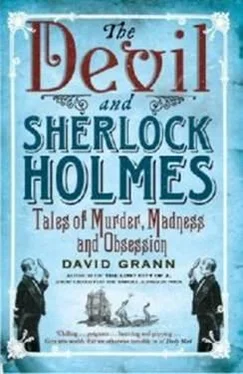Although Tucker could never give him a satisfactory answer, they struck up a correspondence, and in one of his letters Tucker told him something he had never expected: Bellew had an older half sister named Gaile Tucker, a nurse who lived in Florida. “I called her up and said, ‘Are you sitting down?’ I said, ‘This is your long-lost brother.’ She said, ‘Oh, my God.’” Later, the two met, studying each other’s features for similarities, trying to piece together a portrait of a man they barely knew.
“I don’t have any ill feelings,” his daughter told me. “I just don’t have any feelings.”
At one point, Bellew read me part of a letter that Tucker had recently sent him: “I’m sorry things turned out the way they did… I never got to take you fishing, or to baseball games or to see you grow up… I don’t ask you to forgive me as there is too much lost but just so you know I wish you the best. Always. Your dad, Forrest.”
Bellew said he didn’t know if he would continue the correspondence, not because of what Tucker had done to him but because of what he had done to his mother. “He blew my mother’s world apart,” Bellew told me. “She never remarried. There was a song she used to sing to me called ‘Me and My Shadow,’ all about being alone and blue. And when she had cancer, and wasn’t going to live much longer, I broke down and she sang that song, and I realized how bittersweet it was. It was her life.”
In the spring of 2002, when I visited Tucker’s third wife in Pompano Beach, she seemed to be still trying to cope. A small, delicate woman, now in her seventies, she had had several operations and lived alone in their house. “With Forrest gone, there’s no one to fix things up,” she said. She paused, scanning the den where he used to keep his musical instruments. “The silence is unbearable.” She showed me a picture of the two of them, taken shortly after they met. They are standing side by side, their arms touching. He has on a red shirt and tie, and his wavy hair is neatly combed to one side. “God, he used to be so handsome,” she said. “When I met him, he was a doll.”
She turned the picture of him over several times in her hand. “I waited all those years,” she said as she walked me outside, wiping her eyes. “I thought we had the rest of our lives together. What am I supposed to do now?”
One of the last times I met Tucker in prison, he looked alarmingly frail. His facial muscles seemed slack, and his hands trembled. Since his incarceration, he had had several strokes, and a cardiologist concluded that blood clots were gradually cutting off oxygen to his brain. His daughter told me bluntly, “He’ll die in prison.”
“Everyone says I’m smart,” Tucker said to me. “But I’m not smart in the ways of life or I wouldn’t have done the things I did.” After a brief flurry of attention following his arrest, he had been all but forgotten. “When I die, no one will remember me,” he said. His voice was almost a whisper. “I wish I had a real profession, something like the music business. I regret not being able to work steady and support my family. I have other regrets, too, but that’s as much as one man can stand. Late at night, you lie in your bunk in prison and you think about what you lost, what you were, what you could’ve been, and you regret.”
He said that his wife was thinking of selling their house and moving into a community where she could see more people. Although he and his wife still spoke regularly, Tucker said, she was too frail to visit.
“What hurts most… is that I know how much I disappointed my wife,” he went on. “That hurts more than anything.”
As he rose to go, he took a piece of paper from his back pocket. “I made this up for you last night,” he said.
On it was a list of all his escapes, neatly printed. At the bottom, there was a No. 19-one more than he had actually made-left blank. As the guard fetched his wheelchair, he waved him away. “I don’t need my chariot,” he said. Then slowly, with his back hunched, he steadied himself against the wall and, with the guard standing behind him, inched down the corridor.
– January, 2003
Stealing Time
WHY RICKEY HENDERSON WON’T GO HOME
One summer night not long ago, Rickey Henderson, the greatest base stealer and lead-off hitter in baseball history, stood in a dugout, pinching the front of his jersey and plucking it several inches from his chest-“peacocking,” as some players call it. He went through the same pregame rituals that he has performed since he was a rookie outfielder with the Oakland A’s, in 1979. He sorted through a bunch of bats, asking, “Which one of you bad motherfuckers has got a hit in you?” Picking one up with resin on the handle, he cocked it back, waiting for an imaginary pitch, and talked to himself in the third person, the words running together so fast that they were nearly unintelligible: “Let’s-burn-Rickey-come-on-let’s-burn.”
Henderson is accustomed not only to beating his opponents but also to lording his abilities over them. As a ten-time All Star for the A’s, the New York Yankees, and seven other teams, he stole more than fourteen hundred bases-a record that is considered untouchable, like Joe DiMaggio’s fifty-six-game hitting streak. He scored more runs than Ty Cobb, Babe Ruth, or Hank Aaron. Bill James, the oracle of baseball statistics, wrote, “Without exaggerating one inch, you could find fifty Hall of Famers who, all taken together, don’t own as many records.” Or, as Henderson puts it, “I’m a walking record.”
As Henderson stepped onto the field, he stopped abruptly. A foul odor was seeping from under the dugout. “Where’s it coming from?” one of his teammates asked. Several players bent down, trying to find the source of the smell; previously, the manager had found a dead rat in the stadium.
“I think it’s coming from over here,” one player said. “See that hole?”
Henderson tried to ignore the commotion and resume his routine. He walked toward the batter’s box, moving casually, as if he were out for an evening stroll. An opposing player once noted that it took him longer to get to the batter’s box than to drive to the stadium. Henderson has said that his slow approach is a way to get into a pitcher’s head; opponents have said that it is simply another means for Henderson to let the world take stock of him. As he reached the batter’s box, informing the world what Rickey was going to do to the ball, he again seemed disconcerted, and looked up at the crowd: there were only six hundred or so fans in the stadium, and many of the women had dressed up, as part of a promotional Eighties Night, in sequins and lace stockings, like Madonna in her “Like a Virgin” phase.
Earlier, Henderson had confessed to me, “Last night, I dropped down on my knees and I asked God, ‘Why are you doing this to Rickey? Why did you put me here?’”
An announcer called his name on the scratchy P.A. system: “Now batting lead-off for the San Diego Surf Dawgs… RICKEY HENDERSON.”
The man who once proclaimed “I am the greatest of all time!” was, at the age of forty-six, playing in the Golden Baseball League. It wasn’t the majors. It wasn’t even part of the minor-league farm system. It was an independent league, which consisted largely of players who had never made it to the minors, or had washed out of them. Created by two Stanford business-school graduates, the league-which began operating in 2005, with eight teams in Arizona and California-is widely considered to be the bottom of the bottom. Yet it is here that Henderson suited up for three thousand dollars a month, less than he could bring in selling a piece of memorabilia from his days in the majors.
“Come on, hot dawwwg, let’s see what you can do!” a fan yelled.
Читать дальше











